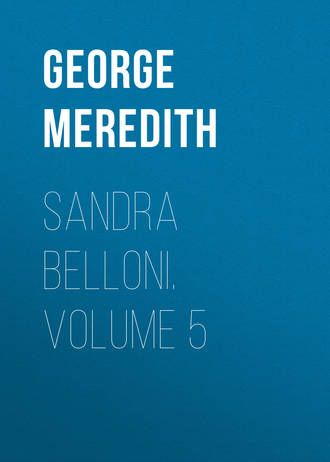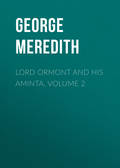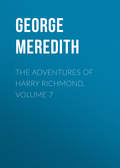
George Meredith
Sandra Belloni. Volume 5
CHAPTER XXXVII
A knock at Merthyr's chamber called him out while he sat writing to Marini on the national business. He heard Georgiana's voice begging him to come to her quickly. When he saw her face the stain of tears was there.
"Anything the matter with Charlotte?" was his first question.
"No. But, come: I will tell you on the way. Do not look at me."
"No personal matter of any kind?"
"Oh, no! I can have none;" and she took his hand for a moment.
They passed into the dark windy street smelling of the sea.
"Emilia is here," said Georgiana. "I want you to persuade her—you will have influence with her. Oh, Merthyr! my darling brother! I thank God I love my brother with all my love! What a dreadful thing it is for a woman to love a man:"
"I suppose it is, while she has nothing else to do," said Merthyr. "How did she come?—why?"
"If you had seen Emilia to-night, you would have felt that the difference is absolute." Georgiana dealt first with the general case. "she came, I think, by some appointment."
"Also just as absolute between her and her sex," he rejoined, controlling himself, not to be less cool. "What has happened?"
Georgiana pointed to the hotel whither their steps were bent. "That is where Charlotte sleeps. Her going there was not a freak; she had an object. She wished to cure Emilia of her love for Mr. Wilfrid Pole. Emilia had come down to see him. Charlotte put her in an adjoining room to hear him say—what I presume they do say when the fit is on them! Was it not singular folly?"
It was a folly that Merthyr could not understand in his friend Charlotte.
He said so, and then he gave a kindly sad exclamation of Emilia's name.
"You do pity her still!" cried Georgiana, her heart leaping to hear it expressed so simply.
"Why, what other feeling can I have?" said he unsuspiciously.
"No, dear Merthyr," she replied; and only by her tone he read the guilty little rejoicing in her heart, marvelling at jealousy that could twist so straight a stem as his sister's spirit. This had taught her, who knew nothing of love, that a man loving does not pity in such a ease."
"I hope you will find her here:" Georgiana hurried her steps. "Say anything to comfort her. I will have her with me, and try and teach her what self-control means, and how it is to be won. If ever she can act on the stage as she spoke to-night, she will be a great dramatic genius. She was transformed. She uses strange forcible expressions that one does not hear in every-day life. She crushed Charlotte as if she had taken her up in one hand, and without any display at all: no gesture, or spasm. I noticed, as they stood together, that there is such a contrast between animal courage and imaginative fire."
"Charlotte could meet a great occasion, I should think," said Merthyr; and, taking his sister by the elbow: "You speak as if you had observed very coolly. Did Emilia leave you so cold? Did she seem to speak from head, not from heart?"
"No; she moved me—poor child! Only, how humiliating to hear her beg for love!—before us."
Merthyr smiled: "I thought it must be the woman's feeling that would interfere to stop a natural emotion. Is it true—or did I not see that certain eyes were red just now?"
"That was for him," said Georgiana, hastily. "I am sure that no man has stood in such a position as he did. To see a man made publicly ashamed, and bearing it. I have never had to endure so painful a sight."
"To stand between two women, claimed by both, like Solomon's babe! A man might as well at once have Solomon's judgement put into execution upon him. You wept for him! Do you know, Georgey, that charity of your sex, which makes you cry at any 'affecting situation,' must have been designed to compensate to us for the severities of Providence."
"No, Merthyr;" she arrested his raillery. "Do I ever cry? But I thought—if it had been my brother! and almost at the thought I felt the tears rush at my eyelids, as if the shame had been mine."
"The probability of its not being your brother seemed distant at the moment," said Merthyr, with his half-melancholy smile. "Tell me—I can conjure up the scene: but tell me whether you saw more passions than one in her face?"
"Emilia's? No. Her face reminded me of the sombre—that dull glow of a fire that you leave burning in the grate late on winter nights. Was that natural? It struck me that her dramatic instinct was as much alive as her passion."
"Had she been clumsy, would you not have been less suspicious of her? And if she had only shown the accustomed northern retenue, and merely looked all that she had to say 'preserved her dignity'—our womanly critic would have been completely satisfied."
"But, Merthyr, to parade her feelings, and then to go on appealing!"
"On the principle that she ought to be ashamed of them, she was wrong."
"If you had heard her utter abandonment!"
"I can believe that she did not blush."
"It seems to me to belong to those excesses that prompt—that are in themselves a species of suicide."
"Love is said to be the death of self."
"No; but I must use cant words, Merthyr; I do wish to see modesty. Yes,
I know I must be right."
"There is very little of it to be had in a tropical storm."
"You admit, then, that this sort of love is a storm that passes?"
"It passes, I hope."
"But where is your defence of her now?"
"Have I defended her? I need not try. A man has deceived her, and she doesn't think it possible; and has said so, I presume. When she sees it, she will be quieter than most. She will not reproach him subsequently. Here is the hotel, and that must be Charlotte's room, if I may judge by the lights. What pranks will she always be playing! We seem to have brought new elements into the little town. Do you remember Bergamo the rainy night the Austrian trooped out of Milan?—one light that was a thousand in the twinkling of an eye!"
Having arrived, he ran hastily up to the room, expecting to find the three; but Lady Charlotte was alone, sitting in her chair with knotted arms. "Ah, Merthyr!" she said, "I'm sorry you should have been disturbed. I perceive what Georgey's leaving the room meant. I suppose the hotel people are used to yachting-parties." And then, not seeing any friendly demonstration on his part, she folded her arms in another knot. Georgiana asked where Emilia was. Lady Charlotte replied that Emilia had gone, and then Wilfrid had followed her, one minute later, to get her into shelter somewhere. Or put penknives out of her way. "I am rather fatigued with a scene, Merthyr. I never had an idea before of what your Southern women were. One plays decidedly second to them while the fit lasts. Of course, you have a notion that I planned the whole of the absurd business. This is the case:—I found the girl on the beach: she follows him everywhere, which is bad for her reputation, because in this climate people suspect, positive reasons for that kind of female devotedness. So, to put an end to it—really for her own sake, quite as much as anything else—am I a monster of insensibility, Merthyr?—I made her swear an oath: one must be a point above wild animals to feel that to be binding, however! I made her swear to listen and remain there silent till I opened the door to set her at liberty. She consented—gave her word solemnly. I calculated that she might faint, and fixed her in an arm-chair. Was that cruel? Merthyr, you have called me Austrian more than once; but, upon my honour, I wanted her to get over her delusion comfortably. I thought she would have kept the oath, I confess; she looked up like a child when she was making it. You have heard the rest from Georgey. I must say the situation was rather hard on Wilfrid. If he blames me it will be excuseable, though what I did plan was to save him from a situation somewhat worse. So now you know the whole, Merthyr. Commence your lecture. Make me a martyr to the sorrows of Italy once more."
Merthyr took her wrist, feeling the quick pulse, and dropped it. She was effectually humbled by this direct method of dealing with her secret heart. After some commonplace remarks had passed, she herself urged him to send out men in search for Emilia. Before he went, she murmured a soft "Forgive me." The pressure of her fingers was replied to, but the words were not spoken.
"There," she cried to Georgiana, "I have offended the only man for whose esteem I care one particle! Devote yourself to your friends!"
"How? 'devote yourself!'" murmured Georgiana, astonished.
"Do you think I should have got into this hobble if I hadn't wished to serve some one else? You must have seen that Merthyr has a sentimental sort of fondness—call it passion—for this girl. She's his Italy in the flesh. Is there a more civilized man in the world than Merthyr? So he becomes fascinated by a savage. We all play the game of opposites—or like to, and no woman in his class will ever catch him. I couldn't have believed that he was touched by a girl, but for two or three recent indications. You must have noticed that he has given up reading others, and he objected the other day to a responsible office which would have thrown him into her neighbourhood alone. These are unmistakeable signs in Merthyr, though he has never been in love, and doesn't understand his case a bit. Tell me, do you think it impossible?"
Georgiana answered dryly, "You have fallen into a fresh mistake."
Exactly. Then let me rescue you from a similar fatality, Georgey. If your eyes are bandaged now…"
"Are you going to be devoted to me also, Charlotte?"
"I believe I'm a miracle of devotion," said the lady, retiring into indifferent topics upon that phrase. She had at any rate partially covered the figure of ridicule presented to her feminine imagination by the aspect of her fair self exposed in public contention with one of her sex—and for a man. It was enough to make her pulse and her brain lively. On second thoughts, too, it had struck her that she might be serving Merthyr in disengaging Emilia; and undoubtedly she served Georgiana by giving her a warning. Through this silliness went the current of a clear mind, nevertheless. The lady's heart was justified in crying out: "What would I not abandon for my friend in his need?" Meantime her battle in her own behalf looked less pleasing by the light of new advantages. The question recurred: "Shall I care to win at all?" She had to force the idea of a violent love to excuse her proceedings. To get up any flame whatsoever, an occasional blast of jealousy had to be called for. Jealousy was a quality she could not admit as possible to her. So she acted on herself by an agent she repudiated, and there was no help for it. Had Wilfrid loved her the woman's heart was ready. It was ready with a trembling tenderness, softer and deeper than a girl's. For Charlotte would have felt: "With this love that I have craved for, you give me life." And she would have thanked him for both, exultingly, to feel: "I can repay you as no girl could do;" though she had none of the rage of love to give; as it was, she thought conscientiously that she could help him. She liked him: his peculiar suppleness of a growing mind, his shrouded sensibility, in conjunction with his reputation for an evidently quite reliable prompt courage, and the mask he wore, which was to her transparent, pleased her and touched her fancy.
Nor was he so vain of his person as to make him seem like a boy to her. He affected maturity. He could pass a mirror on his right or his left without an abstracted look over either shoulder;—a poor example, but worth something to a judge of young men. Indeed, had she chosen from a crowd, the choice would have been one of his age. She was too set for an older man; but a youth aspiring to be older than he was; whose faults she saw and forgave; whose merits supplied two or three of her own deficiencies; whom her station might help to elevate; to whom she might come as a benefactress; feeling so while she accomplished her own desire;—such a youth was everything to her, as she awoke to discover after having played with him a season. If she lost him, what became of her? Even if she had rejoiced in a mother to plot and play,—to bait and snare for her, her time was slipping, and the choosers among her class were wary. Her spirit, besides, was high and elective. It was gradually stooping to nature, but would never have bowed to a fool, or, save under protest, to one who gave all. On Wilfrid she had fixed her mind: so, therefore, she bore the remembrance of the recent scene without much fretting at her burdens;—the more, that Wilfrid had in no way shamed her; and the more, that the heat of Emilia's love played round him and illumined him. This borrowing of the passion of another is not uncommon.
At daybreak Mrs. Chump was abroad. She had sat up for Wilfrid almost through the night. "Oh! the arr'stocracy!" she breathed exclamations, as she swept along the esplanade. "I'll be killed and murdered if I tell a word." Meeting Captain Gambier, she fell into a great agitation, and explained it as an anxiety she entertained for Wilfrid; when, becoming entangled in the mesh of questions, she told all she knew, and nearly as much as she suspected: which fatal step to retrieve, she entreated his secresy. Adela was now seen fluttering hastily up the walk, fresh as a creature of the sea-wave. Before Mrs. Chump could summon her old wrath of yesterday, she was kissed, and to the arch interrogation as to what she had done with this young lady's brother, replied by telling the tale of the night again. Mrs. Chump was ostentatiously caressed into a more comfortable opinion of the world's morality, for the nonce. Invited by them to breakfast at the hotel, she hurried back to her villa for a flounced dress and a lace cap of some pretensions, while they paced the shore.
"See what may be said!" Adela's countenance changed as she muttered it.
"Thought, would be enough," she added, shuddering.
"Yes; if one is off guard—careless," the captain assented, flowingly.
"Can one in earnest be other than careless? I shall walk on that line up to the end. Who makes me deviate is my enemy!"
The playful little person balanced herself to make one foot follow the other along a piece of washed grey rope on the shingle. Soon she had to stretch out her hand for help, and the captain at full arm's length conducted her to the final knot.
"Arrived safe!" she said, smiling.
"But not disengaged," he rejoined, in similar style.
"Please!" She doubled her elbow to give a little tug for her fingers.
"No." He pressed them tighter.
"Pray?"
"No."
"Must I speak to somebody else to get me released?"
"Would you?"
"Must I?"
"Thank heaven, he is not yet in existence!"
'Husband' being implied. Games of this sweet sort are warranted to carry little people as far as they may go swifter than any other invention of lively Satan.
The yachting party, including Mrs. Chump, were at the breakfast-table, and that dumb guest had done all the blushing for Lady Charlotte, when Wilfrid entered, neat, carefully brushed, and with ready answers, though his face could put on no fresh colours. To Mrs. Chump he bent, passing, and was pushed away and drawn back. "Your eyes!" she whispered.
"My—yeyes!" went Wilfrid, in schoolboy style; and she, who rarely laughed, was struck by his humorous skill, saying to Sir Twickenham, beside her: "He's as cunnin' as a lord!"
Sir Twickenham expressed his ignorance of lords having usurped priority in that department. Frightened by his portentous parliamentary phraseology, she remained tolerably demure till the sitting was over: now sidling in her heart to the sins of the great, whom anon she angrily reproached. Her principal idea was, that as the world was discovered to be so wicked, they were all in a boat going to perdition, and it would be as well to jump out immediately: but while so resolving, she hung upon Lady Charlotte's looks and little speeches, altogether seduced by so fresh and frank a sinner. If safe from temptation, here was the soul of a woman in great danger of corruption.
"Among the aristocracy," thought Mrs. Chump, "it's just the male that hangs his head, and the female struts and is sprightly." The contrast between Lady Charlotte and Wilfrid (who when he ceased to set outrageously, sat like a man stricken by a bolt), produced this reflection: and in spite of her disastrous vision of the fate of the boat they were in, Mrs. Chump owned to the intoxication of gliding smoothly— gliding on the rapids.
The breakfast was coming to an end, when Braintop's name was sent in to Mrs. Chump. She gave a cry of motherly compassion for Braintop, and began to relate the little deficiencies of his temper, while, as it were, simmering on her seat to go to him. Wilfrid sent out word for him to appear, which he did, unluckily for himself, even as Mrs. Chump wound up the public description of his character by remarking: "He's just the opposite of a lord, now, in everything." Braintop stood bowing like the most faithful confirmation of an opinion ever seen. He looked the victim of fatigue, in the bargain. A light broke on Mrs. Chump.
"I'll never forgive myself, ye poor gentle heart, to throw pens and pen- wipers at ye, that did your best, poor boy! What have ye been doin'? and why didn't ye return, and not go hoppin' about about all night like a young kangaroo, as they say they do? Have ye read the 'Arcana of Nature and Science,' ma'am?"
The Hon. Mrs. Bayruffle, thus abruptly addressed, observed that she had not, and was it an amusing book?
"Becas it'll open your mind," pursued Mrs. Chump; "and there, he's eatin'! and when a man takes to eatin', ye'll never have any fear about his abouts. And if ye read the 'Arcana of Nature and Science,' ma'am, ye'll first feel that ye've gone half mad. For it contains averything in the world; and ye'll read ut ten times all through, and not remember five lines runnin'! Oh, it's a dreadful book: and that's the book to read to your husband when he's got a fit o' the gout. He's got nothin' to do but swallow knolludge then. Now, Mr. Braintop, don't stop, but tell me as ye go on what ye did with yourself all night."
A slight hesitation in Braintop caused her to cross-examine him rigidly, suggesting that he might not dare to tell, and he, exercising some self- command, adopted narrative as the less ignominious form of confession. No one save Mrs. Chump listened to him until he mentioned the name Miss Belloni; and then it was curious to see the steadiness with which certain eyes, feigning abstraction, fixed in his direction. He had met Emilia on the outskirts of the town, and unable to persuade her to take shelter anywhere, had walked on with her in dead silence through the night, to the third station of the railway for London.
"Is this a mad person?" asked the Hon. Mrs. Bayruffle.
Adela shrugged. "A genius."
"Don't eat with the tips of your teeth, like a bird, Mr. Braintop, for no company minds your eatin'," cried Mrs. Chump, angrily and encouragingly; "and this little Belloni—my belief is that she came after you; and what have ye done with her?"
It was queerly worried out of Braintop, who was trying his best all the time to be obedient to Wilfrid's direct eye, that the two wanderers by night had lost themselves in lanes, refreshed themselves with purloined apples from the tree at dawn, obtained a draught of morning milk, with a handful of damsons apiece, and that nothing would persuade Emilia to turn back from the route to London. Braintop bit daintily at his toast, unwilling to proceed under the discouraging expression of Wilfrid's face, and the meditative silence of two or three others. The discovery was forcibly extracted that Emilia had no money;—that all she had in her possession was sevenpence and a thimble; and that he, Braintop, had but a few shillings, which she would not accept.
"And what has become of her?" was asked.
Braintop stated that she had returned to London, and, blushing, confessed that he had given her his return ticket.
Georgiana here interposed to save him from the awful encomiums of Mrs. Chump, by desiring to know whether Emilia seemed unhappy or distressed. Braintop's spirited reply, "Not at all," was corrected to: "She did not cry;" and further modified: "That is, she called out sharply when I whistled an opera tune."
Lady Charlotte put a stop to the subject by rising pointedly. Watch in hand, she questioned the ladies as to their occupations, and told them what time they had to dispose of. Then Baynes, captain of the yacht, heard to be outside, was summoned in. He pronounced doubtfully about the weather, but admitted that there was plenty of wind, and if the ladies did not mind it a little fresh, he was sure he did not. Wind was favourable for the island head-quarters of the yacht. "We'll see who gets there first," she said to Wilfrid, and the company learnt that Wilfrid was going to other head-quarters on special business, whereupon there followed chatter and exclamations. Wilfrid quickly explained that his father's condition called him away imperiously. To Adela and Mrs. Chump, demanding peculiar personal explanations, he gave reassuring reasons separately, aside. Mrs. Chump understood that this was merely his excuse to get away, that he might see her safe to Brookfield. Adela only required a look and a gesture. Merthyr and Georgiana likewise spoke expected adieux, as did Sir Twickenham, who parted company in his own little yawl. Lady Charlotte, with her head over a map, and one hand arranging an eye-glass, hastily nodded them off, scarcely looking at them. She allowed herself to be diverted from this study for an instant by the unbefitting noise made by Adela for the loss of her brother; not that she objected to the noise particularly (it was modulated and delicate in tone), but that she could not understand it. Seeing Sir Twickenham, however, in a leave-taking attitude, she uttered an easy "Oh!" to herself, and diligently recommenced spying at ports and harbours, and following the walnut thumb of Baynes on the map. All seemed to be perfectly correct in the arrangements. To go to London was Wilfrid's thought; and the rest were almost as much occupied with their own ideas. Captain Gambier received their semi-ironical congratulations and condolences incident to the man who is left alone in the charge of sweet ladies; and the Hon. Mrs. Bayruffle remarked, that she supposed ten hours not a long period of time, though her responsibility was onerous.
"Lady Gosstre is at the island," said Lady Charlotte, to show where it might end, if she pleased. Within an hour the yacht was flying for the island with a full Western breeze: and Mrs. Chump and Wilfrid were speeding to Brookfield, as the latter permitted her to imagine. Braintop realized the fruits of the sacrifice of his return ticket by facing Mrs. Chump in the train. Merthyr had telegraphed to Marini to meet Emilia at the station in London, and instructed Braintop to deliver a letter for her at Marini's house. To Marini he wrote: "Let Giulia guard her as no one but a woman can in such a case. By this time Giulia will know her value. There is dangerous stuff in her now, and my anxiety is very great. Have you seen what a nature it is? You have not alluded to her beyond answers to instructions, but her character cannot have escaped you. I am never mistaken in my estimates of Italian and Cymric blood. Singularly, too, she is part Welsh on the mother's side, to judge by the name. Leave her mind entirely free till it craves openly for some counteraction. Her Italy and her music will not do. Let them be. My fear is that you have seen too clearly what a daughter of Italy I have found for you. But whatever you put up now to distract her, you sacrifice. My good Marini! bear that in mind. It will be a disgust in her memory, and I wish her to love her country and her Art when she recovers. So we treat the disease, dear friend. Let your Italy have no sorrows for her ears till the storm within is tranquil. I am with you speedily."
Marini's reply said: "Among all the things we have to thank our Merthyr for, this treasure, if it is not the greatest he has given to us, makes us grateful the most. We met her at the station. Ah! there was an elbow when she gave her hand. She thought to be alone, and started, and hated, till Giulia smothered her face. And there was dead fire in the eyes, which is powder when you spring it. We go with her to her new lodging, and the track is lost. This is your wish? It is pitching new camps to avoid the enemy. But so! a man takes this disease and his common work at once of a woman—she is all the disease, till it is extinct, or she! What is this disease but a silly, a senseless waste? Giulia—woman that she is!—will not call it so. See her eyes doze and her voice go a soft buzz when she speaks it! As a dove of the woods! That it almost makes it sweet to me! Yes, a daughter of Italy! So Giulia has been:—will be? I know not! So will this your Emilia be in the time that comes to the young people, she has this, as you say, malady very strong—ma, ogni male ha la sua ricetta; I can say it of persons. Of nations to think my heart is as an infidel—very heavy. Ah! till I turn to you—who revive to the thought, as you were an army of deliverance. For you are Hope. You know not Despair. You are Hope. And you love as myself a mother whose son you are not! 'Oh!' is Giulia's cry, 'will our Italy reward him with a daughter?'—the noblest that we have. Yes, for she would be Italian always through you. We pray that you may not get old too soon, before she grows for you and is found, only that you may know in her our love. See! I am brought to talk this language. The woman is in me."
Merthyr said, as he read this, "I could wish no better." His feeling for Emilia waxed toward a self-avowal as she advanced to womanhood; and the last stage of it had struck among trembling strings in the inmost chambers of his heart. That last stage of it—her passionate claiming of Wilfrid before two women, one her rival—slept like a covered furnace within him. "Can you remember none of her words?" he said more than once to Georgiana, who replied: "I would try to give you an idea of what she said, but I might as well try to paint lightning."
"'My lover'?" suggested Merthyr.
"Oh, yes; that she said."
"It sounded oddly to your ears?"
"Very, indeed."
"What more?"
"—did she say, do you mean?"
"Is my poor sister ashamed to repeat it?"







